When it comes to Jane Austen, marriage or an engagement is the desirable end game for her protagonists. But what if that engagement is to the wrong person?
That's the kicker of Sunday's Season 2 finale of "Sanditon," PBS' series adaptation of Austen's unfinished novel of the same name. This is in fact the second horrifying engagement the series has perpetrated. At the end of the first season, broody Sidney Parker (Theo James) tells the love of his life, farm girl Charlotte Heywood (Rose Williams), that he has to marry a wealthier lady to keep his family from financial ruin. And while that cliffhanger promised to be resolved when the series was renewed for two more seasons, by that time James had pulled out, which necessitated killing Sidney off. That's hardly the stuff of Austen.
Going into the new, less sexy yet more "classically Austen" season, pressure was on for "Sanditon" to bring back that loving feeling for Charlotte. And eventually it does. After mourning Sidney, becoming a governess and rebuffing the advances of an entitled colonel, Charlotte and the gruff widower Alexander Colbourne (Ben Lloyd-Hughes) come to a tentative, tender understanding – or so she thinks before he abruptly cuts ties with her. In the season's final scene, which takes place during her sister's wedding, Charlotte awkwardly introduces her new fiancé, a fresh-faced farmer from her hometown of Willingden and most decidedly not Colbourne.
RELATED: Why "Bridgerton" and "Sanditon" dialed back the sex – and came out stronger for it
Head writer Justin Young spoke to Salon about this ending, which amounts to yet another obstacle for Charlotte and her twice-broken heart.
"Charlotte's line in the first episode is that an engagement is a foregone conclusion," he said. "That's the heartbreaking thing about it. She's back in Willingden, and we can tell in that final moment that she's doing this for her family. She's doing this because it's a duty, because she's run out of options. She's tried earning a living, she's tried independence, and it's failed.
"I got a lot of messages of how angry people were about the end of Season 1," he continued. "But hopefully now they know that there is Season 3, they will trust us – that this is not the end of the story, that we know where we're going, that this is the kind of point we have to get to to set everything up for Season 3."
Want a daily wrap-up of all the news and commentary Salon has to offer? Subscribe to our morning newsletter, Crash Course.
"Sanditon" also returned during a particularly Regency-friendly TV landscape. Although the show and its renewal pre-dated the arrival of "Bridgerton," there's no question that the Netflix juggernaut (now the most-watched English-language series in its second season) created an even greater appetite for Regency-era stories on TV.
"I really respect what they do on 'Bridgerton.' "
Young also has another, more personal reason for regarding "Bridgerton" as both admirable and healthy competition.
"Just after we got recommissioned for Season 2, and I was really happy, my dear brother came round and he said, 'I don't know how to tell you this, but I've just been cast in Season 2 of "Bridgerton."' So my brother [Rupert Young] plays the new young Lord Featherington in Season 2 of 'Bridgerton.' Imagine my mother right now; she's got to choose. Which one does she think is better? Which son has made a better show, is it 'Bridgerton' or 'Sanditon'?"
He continued, "I'm being facetious because they are different, and I really respect what they do on 'Bridgerton.' The two shows are so different, in many respects, tonally and stylistically. In a funny way, a lot of the things we got criticized for with Season 1 – that we were a bit irreverent, that we were too sexy – 'Bridgerton' just came in and they did all those things 10 times over. But we're judged on slightly different standards I think because we've got Jane Austen in our title and Andrew Davies is on board."
RELATED: Your brain loves Jane Austen
Check out the rest of the interview with Young, who discusses playing in the Austen sandbox, going dark and Gothic, and what's in store for the (probable) final season of "Sanditon."
The following interview has been edited for length and clarity.
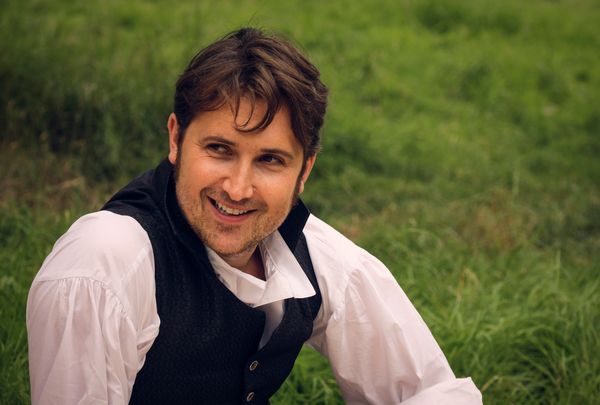 Ben Lloyd-Hughes as Alexander Colbourne in "Sanditon" (Red Planet/PBS)You initially offer up two men who are vying for Charlotte: Colonel Lennox (Tom Weston-Jones), who ends up being a dud, and the Mr. Rochester-esque widower Alexander Colbourne, who we're supposed to be rooting for by the end. At what point did you realize that the audience was finally backing Colbourne and letting go of Sidney?
Ben Lloyd-Hughes as Alexander Colbourne in "Sanditon" (Red Planet/PBS)You initially offer up two men who are vying for Charlotte: Colonel Lennox (Tom Weston-Jones), who ends up being a dud, and the Mr. Rochester-esque widower Alexander Colbourne, who we're supposed to be rooting for by the end. At what point did you realize that the audience was finally backing Colbourne and letting go of Sidney?
"He got to swagger around with an open-neck shirt."
I could sense initially there was resistance. Understandably, there was a kind of distrust about, "Well, we invested in Sidney and we're not sure about this." But we weren't going to try and lob these characters at them; we were going to try and parcel it out.
I know that Lennox had his fans initially. And we positioned it to the audience that it was going to be a kind of love triangle, but actually, it isn't really a love triangle, technically, because Charlotte never really entertains Lennox as a love interest. She finds him entertaining and charming and distracting and she has fun with it.
Whereas Colbourne, it's a slow burn. I saw initially people were wary because he has deliberately a very different energy to Sidney. We didn't want to try and replicate Sidney. And I think there were moments, certainly in Episode 3, there was a moment with the flowers. And there were a few moments where Ben got to be really – he's a very handsome man – he got to swagger around with an open-neck shirt. I could feel people really, really investing in him. And I think [Episode] 4 was when it really locked in at the garden party, and I can see people going, "Oh, OK we're on board this now. We understand who this character is and we understand that he's a much gentler proposition in some respects than Sidney."
Hopefully by then, the audience trusted that we weren't sort of just trying to swap one leading man up for the other. We were respecting the fact that Charlotte is on her journey, grieving Sidney. All of these characters are grieving Sidney, and she's trying to navigate that. She's trying to navigate, "How can I be developing feelings for this other man, when I still have feelings for Sidney?" Hopefully, by the end of the season, the audience are just rooting for Charlotte and Colbourne to work it out.
What went into deciding to give Farmer Ralph the unenviable role of getting in between them?
Now there's the huge obstacle that she's engaged to be married to somebody else, which is the shock at the end of the season. That becomes the question: "Is she going to do the right thing?"
One of the things that we found really, really tricky to get right was how to separate Charlotte and Colbourne at the end of Season 2. We knew we didn't want to resolve everything in that final episode. The Jane Austen archetype is the marriage plot; that's the genre we're in. If the characters get together, that's the end of the story to some degree. So that was a real challenge story-wise. What are we going to do to keep these characters apart? It hangs on a series of misunderstandings. It hangs on their own internal insecurities. He doesn't believe he's a good enough man for her. She's terrified of being hurt again. It comes out of character and their past damage. That's where we leave them heartbroken, both at the end of the season.
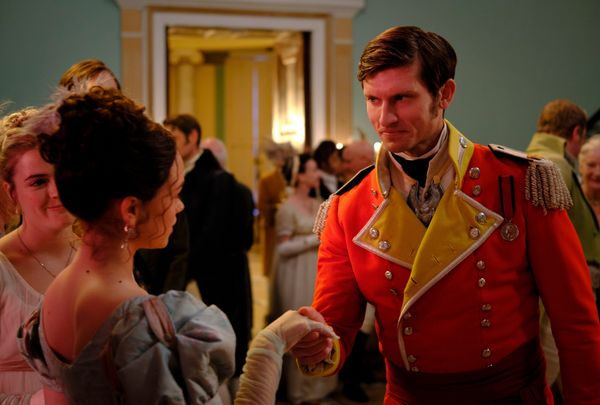 Rose Williams as Charlotte Heywood and Tom Weston-Jones as Colonel Lennox in "Sanditon" (Red Planet/PBs)Yes, while Charlotte can't jump into a relationship right away because of her unresolved feelings for Sidney, Colbourne also has his own baggage. How does it inform his character and bring him to that point where not only does Lennox's insinuation cause Colbourne to break the relationship off with Charlotte, but then he also leaves Sanditon?
Rose Williams as Charlotte Heywood and Tom Weston-Jones as Colonel Lennox in "Sanditon" (Red Planet/PBs)Yes, while Charlotte can't jump into a relationship right away because of her unresolved feelings for Sidney, Colbourne also has his own baggage. How does it inform his character and bring him to that point where not only does Lennox's insinuation cause Colbourne to break the relationship off with Charlotte, but then he also leaves Sanditon?
Colbourne wasn't entirely innocent. He did behave not entirely well with his former wife. Some of those things that Lennox says to Colbourne in the final episode, I don't think they're entirely true . . . but I think there's a grain of truth. Maybe if Colbourne had been more understanding, maybe if he'd been a more attentive husband, maybe he could have played things differently. And he's basically been beating himself up over the last 10 years. So that became part of the DNA of the character.
He's been so isolated for so long, and we thought we want to see Charlotte bring him to life across the season. They bring each other back to life, they recognize that grief in each other, even if it's on an unconscious level. And so, when Lennox presses his buttons, Lennox is a brilliant strategist and knows exactly how to outflank his opponent and zero in on those buttons. And so, what we do in that final episode is we show that guilt is so close to the surface for Colbourne.
I think when he realizes it's not going to happen, and Charlotte kind of sends him away, I think he just feels he just needs to get out of there altogether. So he packs up, he leaves the house; it's all too overwhelming. But also, in a way, his journey across the season is from a man who never leaves the house to . . . leaving his cocoon. He'll be slightly reset when we meet him again at the top of Season 3.
Knowing Jane Austen and her feeling about soldiers, I was just waiting to see how Lennox would show his hand, and we do get it in a big way at the ball where he forces a kiss on Charlotte. But also he mentions something about knowing her station after she turns down his proposal. What is his perspective on her and women of certain ranks in society during that time?
Jane Austen is so much about the minutiae of social hierarchy and where everyone stands. In becoming a governess, Charlotte's taken down a peg or two. In the second episode, we see that she has to sit at the the wrong end of the table. And we sort of cheated it because she still goes to balls and things; she's not a total pariah. But at the same time, Lennox is a man who's been revered for so long, he's been surrounded by men telling him he's a hero and he's brilliant. He's so aware of status, that he believes he's doing her a favor [proposing]. He hasn't heard the word "no" for years and years and years. And I think it doesn't occur to him that this woman who's reduced to being a governess, why would she say no? You know, "I'm handsome. I'm a colonel. I'm a man of enormous high status." So I think he's genuinely shocked and offended in that moment, by that [refusal].
RELATED: Fifty shades of Mr. Darcy: A brief history of X-rated Jane Austen adaptations
That that's so far removed from Colbourne, who is in every way, a much more egalitarian person. You see it in the dynamic that Colbourne has with his housekeeper, Mrs. Wheatley [Flo Wilson] where they're almost equals. She understands him, and you feel that actually, he sees her as a peer. Colbourne feels far less hidebound by these kinds of social hierarchies.
With Lennox, we sort of drip-fed his true colors. You see them in the way he is with Tom Parker [Kris Marshall] where he's just a man who always gets his own way. He likes to be in control – he's a colonel – and that's how he is in every situation. He engages with Charlotte in that first episode, when she basically says she doesn't want to be a soldier's wife. And that's the moment that he locks on, because he's like, "Right, a challenge. And I like this, and therefore I have to win her." Because if she was too meekly submissive in that moment, he wouldn't have been interested. So when she rejects him, he just doesn't understand. Robin French who wrote that episode – "Be mindful of your status," that was his line that was so perceptive in that moment. It's humiliating for him, for a man like that to be rejected. It's not, "I love you, and I'm hurt." It's the, "You don't reject a colonel. Understand who I am. You're not obeying orders." He is mansplaining.
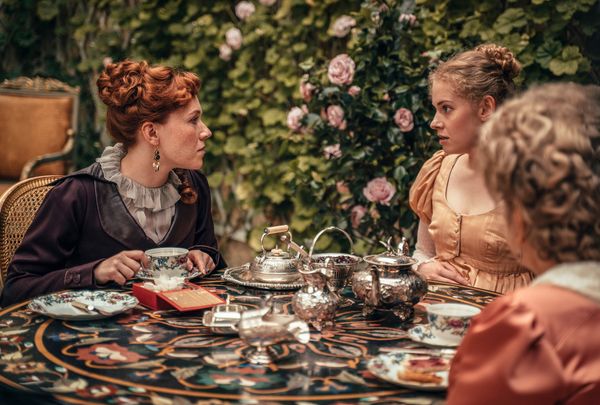 Charlotte Spencer as Esther, Lady Babington and Lily Sacofsky as Clara Brereton in "Sanditon" (Red Planet/PBS)Moving on to probably the most unequivocally bad villain in the series: Edward (Jack Fox). I actually was a little bit shocked about how far he went, using poison, well, laudanum on his step-sister Esther (Charlotte Spencer). Gaslighting her into thinking she was abandoned by Lord Babington because of her difficulties conceiving was bad enough, but hurting her health was getting into gothic territory, I felt. How did the writers decide on that action and how far you wanted it to go?
Charlotte Spencer as Esther, Lady Babington and Lily Sacofsky as Clara Brereton in "Sanditon" (Red Planet/PBS)Moving on to probably the most unequivocally bad villain in the series: Edward (Jack Fox). I actually was a little bit shocked about how far he went, using poison, well, laudanum on his step-sister Esther (Charlotte Spencer). Gaslighting her into thinking she was abandoned by Lord Babington because of her difficulties conceiving was bad enough, but hurting her health was getting into gothic territory, I felt. How did the writers decide on that action and how far you wanted it to go?
We surprised ourselves a bit with that. One of the curious things about these two seasons was we shot it obviously during COVID. Because we were making 12 episodes back-to-back [two seasons with six episodes apiece] we were shooting two units at any given moment, four episodes at any given moment, and so we had to necessarily keep the different storylines separate. In the storytelling, you might notice they feel quite discrete from each other and that was a production requirement as much as something else. Edward and Esther and Clara [Lily Sacofsky] in the first season always had a slightly gothic quality. The sets, it was all very gothic. So I always felt we could slightly turn up the kind of gothic energy with them, and it would fit.
The challenge with that particular strand was that Mark [Stanley], who played Lord Babington was not available. And so it was, "What was the story we could tell with those actors that were available to us? What could Edward do? What is his ammunition?" I think it was Charles Sturridge, our director who had the idea of maybe he could try and convince Esther she was mad. And it was partly that we know what an incredible actress Charlotte is and how she can play those big emotions.
There's always a danger when you're playing a lot of love stories that it can become twee or sickly. You need a little bit of astringency to kind of cut against that, a little bit of darkness just to mitigate against that. So we thought maybe we can have something that's a bit darker here. The performances keep it rooted, it's rooted in real emotions. It felt so dastardly and so big, there was something kind of delicious about that at the same time.
You want to calibrate it. So you've got Carter [Maxim Ays] and you've got Lennox; they're not total baddies. Lennox is just arrogant, and power-mad. Carter is just a bit dim and a bit shallow. But Edward is just so awful. The fun was, let's take him as dark as we possibly can. And at the end of the series, we thought, well, this is really fun to have Lady Denham [Anne Reid] not say, "You're banished," but to say, "My challenge now is, can I reprogram you? Can I convert Edward Denham into a good man?" Which is a very good question, I have to say, based on what we've seen of him so far.
Edward actually takes up Lady Denham on her offer, but is redemption actually possible? I don't know if I even saw a glimmer of remorse for hurting Esther.
There's a moment where he asks where his son is. I think there's a tiny note of ambiguity. Is that a flicker of genuine sadness? Is he genuinely gonna miss his child? Is he genuinely got feelings for him? Or is it just anger? And I choose to believe that somewhere on some molecular level, being a father has unlocked something in Edward. But we shall see.
I was kind of worried about Esther though. Even though she's escaped Edward's nefarious scheme, and then Clara gave her son George to her, I wasn't certain that Lord Babington would accept this random baby just because Esther wants that.
I can tell you because we tried every possible way to get Mark back. He had another job. So he was very busy. But I even wrote a voiceover – originally, we had Esther in the carriage, and you hear Babington's letter saying that he will love the child as his own, and that the child is his heir. And in the end, production-wise, we couldn't get Esther into the carriage on that day and we couldn't get Mark to do the voiceover. But there's no doubt in my mind that that child will be Lord Babington one day, and Babington will absolutely accept it as his son and heir. It's a real shame that production-wise we couldn't get those scenes in. But rest assured, that is Esther's happy ending. They will be a happy family.
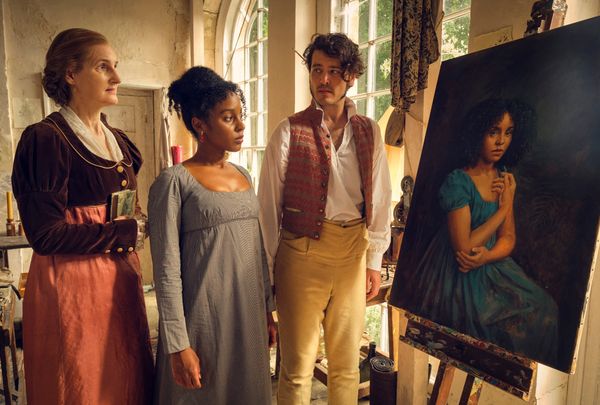 Sandy McDade as Miss Hankins, Crystal Clarke as Georgiana Lambe and Alexander Vlahos as Charles Lockhart in "Sanditon" (Red Planet/PBS)I was happier in some ways with the Georgiana (Crystal Clarke) storyline coming back because it seemed she had more agency and an identity. But then why decide to have her get hoodwinked by the artist Charles Lockhart (Alexander Vlahos), who also was scheming to get his hands on her inheritance? And then now we discover her mother might actually be alive!
Sandy McDade as Miss Hankins, Crystal Clarke as Georgiana Lambe and Alexander Vlahos as Charles Lockhart in "Sanditon" (Red Planet/PBS)I was happier in some ways with the Georgiana (Crystal Clarke) storyline coming back because it seemed she had more agency and an identity. But then why decide to have her get hoodwinked by the artist Charles Lockhart (Alexander Vlahos), who also was scheming to get his hands on her inheritance? And then now we discover her mother might actually be alive!
I will hold up my hands and say I think we short-changed the character in Season 1. And I think it was partly because it was so driven by Charlotte and Sidney, and we saw Georgiana you know, through their eyes to some degree. So when we had the scope to come back, there was no doubt in our mind that we wanted to really honor Georgiana as a character, honor that we had this opportunity to tell a story about a woman of color as a protagonist of a Regency drama. So we did a lot of research, we had Black history consultants, we had people of color on our team to honor the truth of that lived experience. Part of the research was about the sugar boycott that came up, but also there were many women of color who were biracial who inherited money in that way. And nine times out of 10, the story was their white relatives would contest the will, would do everything they could. And we thought, well, that seems like a chewy story to run across the series.
So across both these two seasons, we wanted to really treat Georgiana as if she was the heroine of her own novel, as if there was a novel called "Georgiana." And part of that was her wondering, "Who am I? Where do I come from? How do I square the circle of this curious legacy that my mother was a Black slave, my father was a white plantation owner, and the complications of that? What it means to be the beneficiary of the slave trade?" But also, in some respects, the victim. That her mother was the victim of it is really, really complex.
Charles Lockhart was always designed right from the get-go as – we knew he was nefarious. I know it feels brutal, that Georgiana has been tricked again, but it's in a slightly different way, I think. I maintain that Otis [Jyuddah Jaymes] is a good man who made one error of judgment. Whereas Charles might have started to convince himself that he was on the side of the angels, but he really, really wasn't. What you'll see in Season 3 is Georgiana now on a quest to find out where her mother is, and who is her mother. That comes back to who is she and where does she stand in the world? And how is she going to define herself?
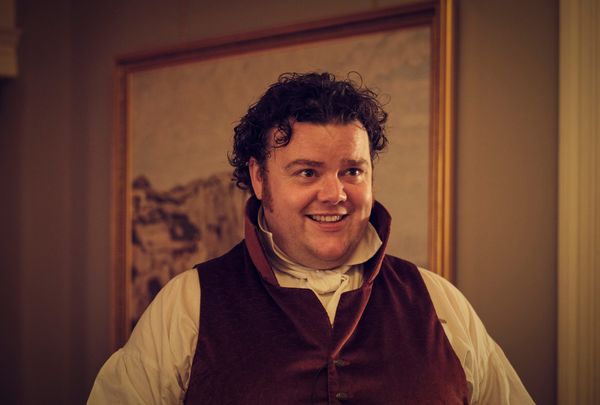 Turlough Convery as Arthur Denham in "Sanditon" (Red Planet/PBS)Someone else who is taken in by Lockhart is Arthur Parker (Turlough Convery). And I actually found him more interesting this season, because in Season 1, he was kind of a classically silly Austen character, this hypochondriac who just talked a lot and was self-involved. Whereas this time, it feels like he's coming more into his own. What went into evolving him and actually having him step up a little bit more? And is he actually gay?
Turlough Convery as Arthur Denham in "Sanditon" (Red Planet/PBS)Someone else who is taken in by Lockhart is Arthur Parker (Turlough Convery). And I actually found him more interesting this season, because in Season 1, he was kind of a classically silly Austen character, this hypochondriac who just talked a lot and was self-involved. Whereas this time, it feels like he's coming more into his own. What went into evolving him and actually having him step up a little bit more? And is he actually gay?
He is absolutely gay. In the family dynamic, because we'd lost Sidney, because Alex[andra Roach] who played Diana [Parker] wasn't able to come back, it felt logical that Arthur would come up in the mix. And Andrew Davies wrote a scene at the end of Season 1 where Arthur said to Diana, "I'm not the marrying kind." I think Andrew wouldn't mind me saying he didn't necessarily mean to out Arthur at that point. I think he was quite surprised that he had, and we all said, "Well, no, that makes absolutely perfect sense. And what a wonderful opportunity."
When we came back to Turlough, we pitched this two-season arc to him. In Season 2, Arthur is beginning to understand who he is. That's how, in a way, Lockhart seduces him. Lockhart is very worldly and aware of his sexual charisma, and Arthur is not. Arthur, on some level, maybe at the back of his mind is beginning to understand that he's gay, but I don't think he could verbalize it yet. So he's aware that he's charmed by Lockhart. When Lockhart draws him he feels seen without quite understanding what that means yet.
Part of the tragedy for Arthur is Arthur's normally a very good judge of character. In many ways, he's the wisest person in the company, but his blind spot is that Lockhart basically charms him and seduces him. By the end of the season, Arthur's hurt by Lockhart's betrayal, on a level that he doesn't fully comprehend, and he's kind of beginning to become aware of his sexuality. But also, he feels responsible for leading Georgiana astray in that way. It's so wonderful that people are invested in their friendship. We knew that Turlough would bring it to life brilliantly, which he does because he's a brilliant comic actor, but he's also really gifted at playing the kind of emotionally devastating stuff as well.
Silly question, but while I enjoyed seeing the hot air balloon at the fair, how did you feel about "Around the World in 80 Days" airing before this with their own hot air balloon scene?
In every episode, we tried to find an event: the first has the army parade, the third has the midsummer fair, the fourth has the garden party. And when we were developing that third episode with Janice [Okoh], the writer, you know, we kind of initially thought of the picnic with Colbourne as the event of the episode. But as we were developing it, that just felt quite quiet and quite low-key. And then at a certain point, Charle Sturridge, the director had this idea. He said, "Well, look, the army would might well have this observation balloon from Waterloo. And wouldn't it be fun?" Initially I thought, is that a bit too ridiculous? But it gives it a focal point. And yeah, obviously we were blissfully unaware of "Around the World in 80 Days," in the same way we were blissfully unaware of "Bridgerton" in Season 1. I think it's fine. You can never have too many hot air balloons. They're always fun to see. And I think it works in that moment and it achieves so many things – allowing Arthur to be the hero and giving that episode its own visual identity, I think it was it was fun.
During the Television Critics Association press tour earlier this year, you said "There are elements in the Episode 1 of Season 2 that pay off in the final episode of Season 3." That's a long arc. If fans are doing a rewatch, just to see what you might be talking about, who should we keep an eye on?
It's Charlotte. Think about where we find her in that opening moments of Season 2. We find a young woman who's trying to move on. She's trying to be who her family needs her to be and then she's pulled back into Sanditon. That is what these these two seasons are about. Everything she says to Colbourne in that scene at the end of that first episode about what she thinks a young woman should be with that independence of spirit, that conversation is absolutely key to Charlotte's journey across these two seasons. These two seasons are absolutely about Charlotte and Georgiana, and how they go from the beginning of Episode 1 in Season 2 to the end of Episode 6 of Season 3. Hopefully, when we speak in a year's time about Season 3, you'll go, "Oh, I see. Right. Yes, that was them."
Having done this show – a continuation of Jane Austen, which has then become its own beast after some unexpected setbacks – were there any lessons that you learned along the way?
One thing I've learned is never try to make two series within a year under lockdown conditions because you will have a nervous breakdown. So that's lesson one. It was very, very intense.
Also I've learned in terms of how quick audiences are to work things out, particularly when they're a collective. The genre we're in, it's not a mystery show. People come to it because they want to know where you're going, that we're going to honor the conventions of the genre. They know the couple is going to get together. The question is, "What journey are we going to take to get there?" They know that some people will turn out to be cads. Those are the rules of engagement. So yeah, I think I've learned just how clever audiences are. We assume that the audience are going to be ahead of us, so we drop a lot of clues.
Also, I would never presume to think we come close to emulating the genius of Jane Austen. We are just playing with some of her crayons, really. But just even trying to ape her style, even trying to ape her wit, and her plotting and her characterization – you go, "Wow, this is so complicated and clever." The way she creates characters who don't know themselves, I think is really interesting. It's a real lesson in how to write subtext, how to characterize characters, and how to take audiences on that journey where you misdirect, where your characters present as a certain thing.
We never had the hubris to say we're trying to create a definitive resolution to her novel. The brief was always that we could use her characters and her world as a jumping-off point to create something that could run and run. For me, these three seasons are kind of self-contained. I honestly don't know if there'll be subsequent seasons.
Watch a very brief teaser for "Sanditon" Season 3 below, via YouTube.
More stories to check out:


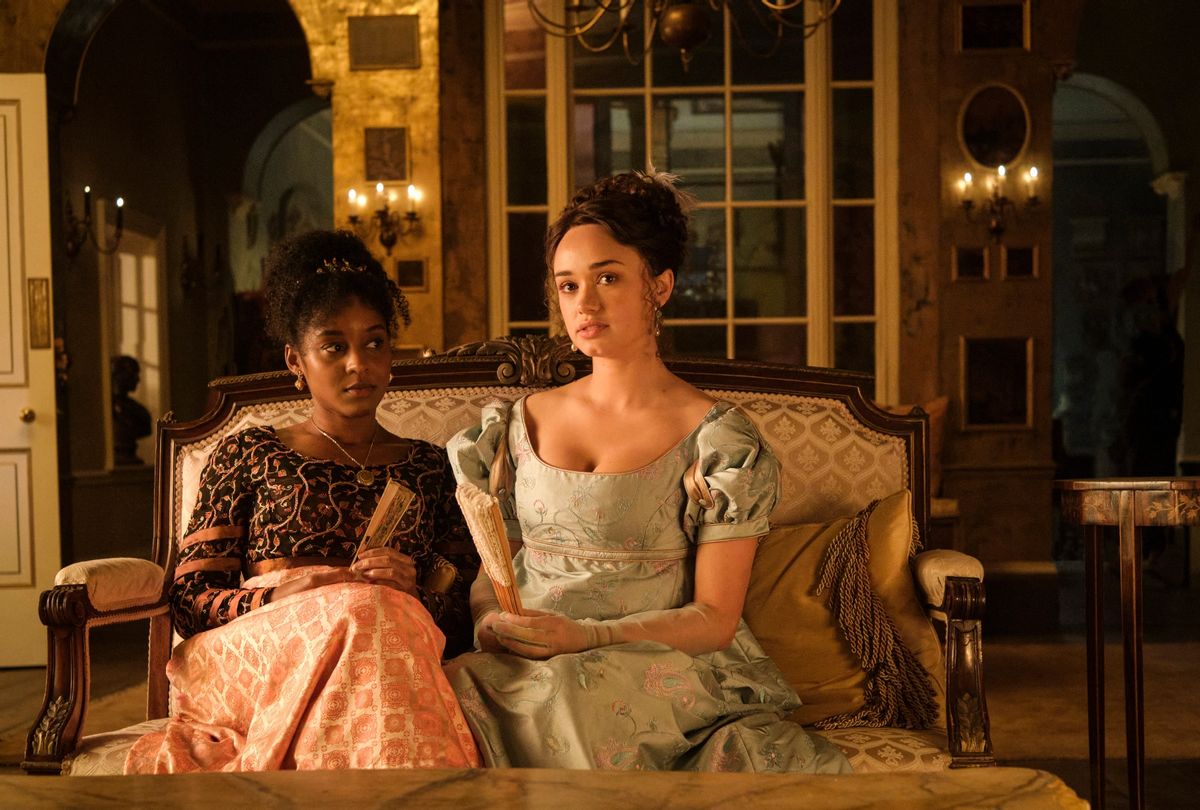
Shares